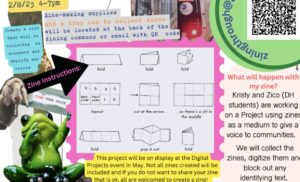Personal Reflection – Week 3
I can’t believe we are already on week 3. Our Feminist Markup Project started with great momentum. Our project manager already sent us materials to get started on learning TEI/XML. Plus we also started to discuss the implications on using a tree hierarchical structure to classify the profiles of female directors that are embedded in complex networks of intertextuality and collaborations due to the nature of their creative job. It’s looking like a very exciting challenge. And I’m super appreciative of the clarity, great organizational skills and eloquence of our Project Manager and team members. We also distributed roles but will collaborate in doing the metadata coordination, which means we all going to get our hands dirty in those XML files, as our first milestone. That also made me reflect how the project is not just a Markup venture but also a digital pedagogy project. I appreciated when Miaoling pointed out that (from our readings) how this groups of tech developers from the start just recruit and assume that all their members know the necessary skillsets to create a tool or digital project. Although I do understand that our current academic world is very compartmentalized and segregated; and of course any discipline under this circumstances needs to develop a team of experts to go deep into their craft. At the same time I do think technological development needs to burst the bubble a little and include into their projects people with no skillset and train them. Simply, because what they do affect all of us and keeping the knowledge locked by just integrating those who already know about how something gets created is another mechanism to reproduce structural inequalities. Plus, the fact that only teams of experts define the terms and categories and the code that goes into creating a tool, is what seals and validates their episteme in the first place. On the other hand, I’m very interested about the agile culture and the scrum methodology. Would love to learn more. After listening to my classmates I realized that maybe is not that there’s no reflection while doing the creation process. But, rather, that the reflection occurs in a different temporality than, say, when we write a paper. As our classmate explained, this reflection maybe occurs after a number of small cycles have passed. Would love to hear more about it and why they deem it valuable as a process of creating things in the world. Finally, I want to bring two things that I found so valuable form classmates. The first one, regarding the project plan we will deliver next week, I absolutely loved when someone said “I would be really grateful if I didn’t have to hide uncertainties”. So well put. So true. And also, something that was discussed for our own group process. If we are going to create a Feminist Markup Project we need to know that we are defining the scope of the project but not the scope of the lives of the female directors. Many of them are alive!! And that just made me think so many hurdles. Like, does a given tag, say, <<location>>, builds a prison box to define an artist that is still producing films. Does it literally <<mark>> that person in a given time and place with no change. I guess people review every so often XML files to update them to a current situation. Because, what about if that given director does not want to associate anymore with the <<location>> tag we created. What if they don’t want to follow the nationalistic logic? what if a “country” does not express their belonging to a place? For example, if we were classifying female directors in Colombia, given our history, I would certainly know that there’s a huge difference between directors born in any city, as opposed to being born in the Pacific or Atlantic coast. There are important historical, cultural and social reasons to differentiate between national and regional location or even other kinds of locations, but for a dataset, do those differences create too much of a mess?. Plus one can also change their mind along life and not belong to any place or multiple places, what if we define location by our migrant stories. But this is all so very exciting because Miaoling remind us constantly that this is an experiment, we can define multiple tags and the lab notes will be super helpful to create an archeology of this kinds of decisions.



